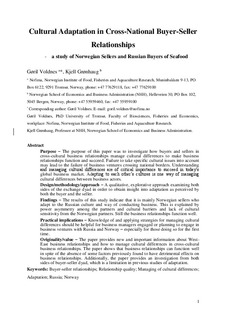Cultural Adaptation in Cross-National Buyer-Seller Relationships - a study of Russian Buyers and Norwegian Sellers of Seafood
Journal article, Peer reviewed
Permanent lenke
http://hdl.handle.net/11250/2424621Utgivelsesdato
2015Metadata
Vis full innførselSamlinger
- Articles (SOL) [143]
- Publikasjoner fra CRIStin (NHH) [249]
Originalversjon
International Journal of Emerging Markets 2015, 10(4):837-857 10.1108/IJoEM-11-2012-0152Sammendrag
Purpose
The purpose of this paper is to investigate how buyers and sellers in cross-cultural business relationships manage cultural differences to ensure functional, successful business relationships. Failure to consider specific cultural issues may lead to the failure of business ventures crossing national borders. To succeed in today’s global business market, it is critically important to understand and manage cultural differences. Adapting to each other’s cultures is one way of managing cultural differences between business actors.
Design/methodology/approach
A qualitative, explorative approach examining both sides of the exchange dyad was adopted to obtain insight into adaptation as perceived by both buyer and seller.
Findings
The results of this study indicate that mainly Norwegian sellers adapt to the Russian culture and way of conducting business. This is explained by power asymmetry between partners, as well as cultural barriers and lack of cultural sensitivity from the Norwegian partners. Still, the business relationships function well.
Practical implications
Knowledge of and applying strategies for managing cultural differences should be helpful for business managers engaged or planning to engage in business ventures with Russia and Norway – especially those doing so for the first time.
Originality/value
The study provides new and important information about West-East business relationships and how to manage cultural differences in cross-cultural business relationships. The study shows that business relationships can function well in spite of the absence of some factors previously found to have detrimental effects on these relationships. In addition, the study investigates both sides of the buyer-seller dyad, which is a limitation in previous studies of adaptation.
Beskrivelse
-This is peer reviewed post print version.
